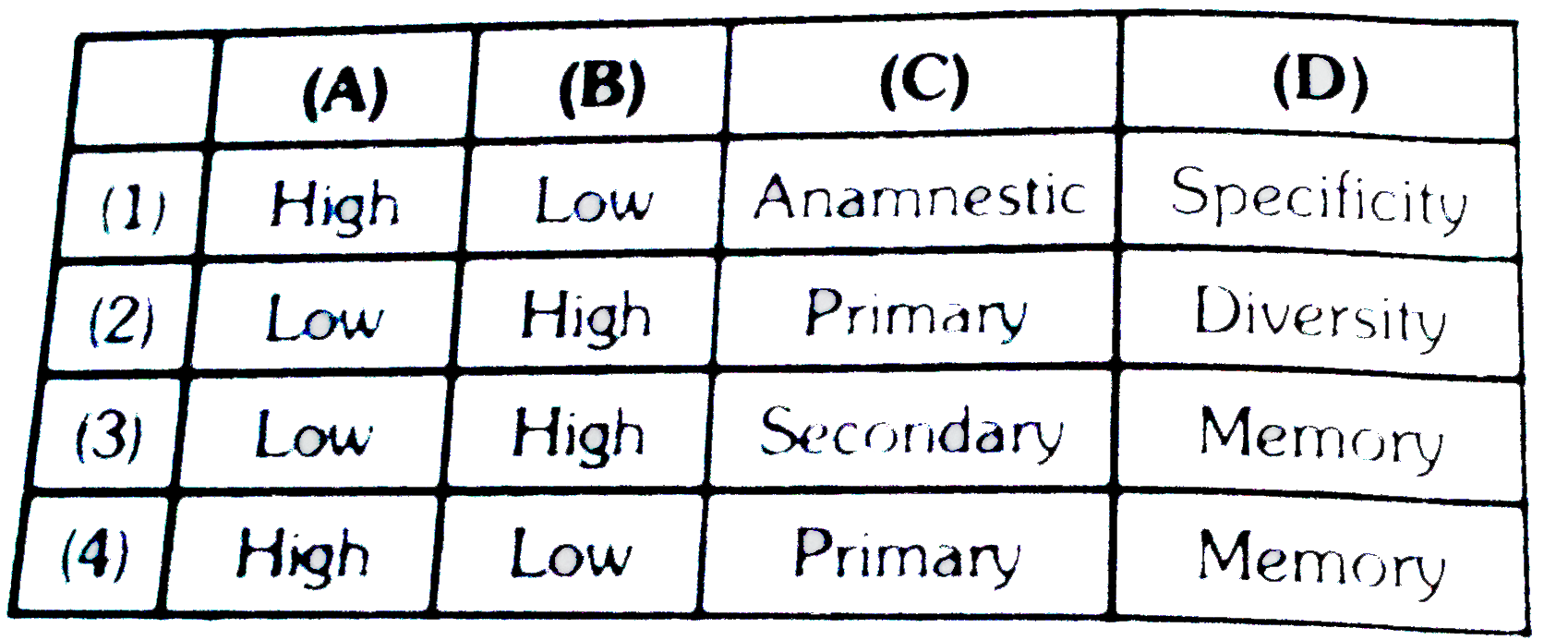During first encounter with the same pathogen, our body elicits a response which is
anamnestic
memory based
highly intensified
primary
The correct Answer is:D
Step-by-Step Solution:
1. Understanding the Question: The question asks about the type of immune response elicited by our body during the first encounter with the same pathogen.
2. Identifying the Options: The options provided are:
- A) Anamnestic
- B) Memory-based
- C) Highly intensified
- D) Primary
3. Analyzing Each Option:
- Option A: Anamnestic: This term refers to an enhanced immune response to an antigen that has been previously encountered. Since the question specifically mentions the "first encounter," this option does not apply.
- Option B: Memory-based: This refers to the immune system's ability to respond more rapidly and effectively to pathogens that have been encountered before. Again, this does not fit the context of a first encounter.
- Option C: Highly intensified: This could imply a strong immune response, but it is usually associated with subsequent encounters with a pathogen, not the first.
- Option D: Primary: The primary immune response is the initial response that occurs when the body encounters a pathogen for the first time. This response is typically of low intensity and takes time to develop.
4. Conclusion: Based on the analysis, the correct answer is Option D: Primary, as this is the response elicited during the first encounter with a pathogen.
- A) Anamnestic
- B) Memory-based
- C) Highly intensified
- D) Primary
- Option A: Anamnestic: This term refers to an enhanced immune response to an antigen that has been previously encountered. Since the question specifically mentions the "first encounter," this option does not apply.
- Option B: Memory-based: This refers to the immune system's ability to respond more rapidly and effectively to pathogens that have been encountered before. Again, this does not fit the context of a first encounter.
- Option C: Highly intensified: This could imply a strong immune response, but it is usually associated with subsequent encounters with a pathogen, not the first.
- Option D: Primary: The primary immune response is the initial response that occurs when the body encounters a pathogen for the first time. This response is typically of low intensity and takes time to develop.
Topper's Solved these Questions
- HUMAN HEALTH DISEASEBOOK - AAKASH SERIESCHAPTER - HUMAN HEALTH DISEASEEXERCISE - EXERCISE - I(LYMPHOID ORGANS)
13 Videos
- HUMAN HEALTH DISEASEBOOK - AAKASH SERIESCHAPTER - HUMAN HEALTH DISEASEEXERCISE - EXERCISE - I(ANTIBODY)
6 Videos
- HUMAN HEALTH DISEASEBOOK - AAKASH SERIESCHAPTER - HUMAN HEALTH DISEASEEXERCISE - EXERCISE - I(IMMUNITY, IMMUNITY DISORDERS, CANCER)
11 Videos
- HISTOLOGY AND ANATOMY OF FLOWERING PLANTSBOOK - AAKASH SERIESCHAPTER - HISTOLOGY AND ANATOMY OF FLOWERING PLANTSEXERCISE - EXERCISE - III (PREVIOUS AIPMT/NEET QUESTIONS)
24 Videos
- MICROBES IN HUMAN WELFARE BOOK - AAKASH SERIESCHAPTER - MICROBES IN HUMAN WELFARE EXERCISE - EXERCISE-III (Previous AIPMT/NEET Questions)
25 Videos
Similar Questions
Knowledge Check
Assertion : Subsequent encounter with the same pathogen elicits a highly intensified anamnestic response.
Reason : This is based on the fact that our body appears to have memory of the first encounter.AIf both assertion and reason are true and reason is the correct explanation of assertion.BIf both assertion and reason are true but reason is not the correct explanation of assertion.CIf assertin is true but reason is false.DIf both assertion and reason are false.Primary response produced due to first time encounter with a pathogen is of
Ahigh intensityBlow intensityCintermediate intensityDno intensity.
When our body encounters first time with a pathogen. Then the first time low intensity response is known as :-
View SolutionImmune response to first encounter with an antigen is called:
View SolutionAssertion. Second infection of the same pathogen is quickly eliminated.
Reason. Preformed memory B and T-cells elicit a quick and vigorous attack on pathogens.
View SolutionWhat is the reason that we burn out our body fat only when we walk briskly? Why does normal walking not burn out the same amount of body fat when the distance covered remains the same?
View SolutionThe B-lymphocytes produce an army of proteins in response to pathogens into our blood to fight with them. These proteins are called
(a) Antigens
(b) Antibodies
(c) Antitoxins
(d) Epitopes
View SolutionReceptors are organs in the body, which bring about response.
View Solution

